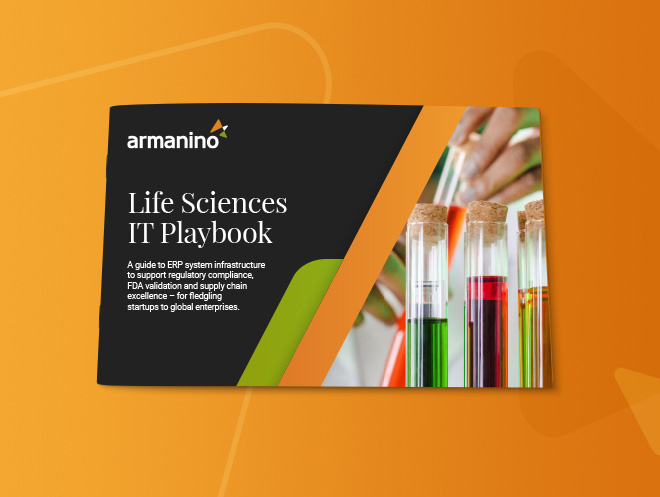Solutions for Life Science Industries

Digital Transformation
Successfully developing a product with cradle-to-grave traceability and documentation requires tight integration among your business’s day-to-day systems. This unification breaks down departmental silos and empowers your teams to work toward companywide digital transformation.
Digital transformation interconnects mission-critical systems and operations to help medical device, biotech, pharmaceutical and nutraceutical manufacturers streamline operations and overcome demanding regulatory, quality and business challenges.
By implementing Microsoft Dynamics 365 CRM, ERP and Power BI, Armanino helps you achieve unified data sharing, resource management and regulatory compliance tracking to help your teams better communicate across diverse channels and operations.
This collaboration helps your company achieve regulatory compliance, gain visibility into your supply chain management, accurately track and control your inventory and integrate industry best practices for corrective and preventive action.
Ultimately, the departmental cohesion achieved with Dynamics 365 gives you the data necessary to quickly make smart, insightful business decisions to spur company growth.
Implementing Dynamics 365 CRM and Dynamics 365 ERP empowers your teams to achieve their desired results by better managing these complex factors while maintaining stringent industry guidelines and best practices.
Armanino understands the regulatory challenges within the life sciences industry, which is why we make it easier for companies like yours to manage them. Whether you’re a medical device, biotech, pharmaceutical or nutraceutical manufacturer, Armanino’s Dynamics 365 ERP and CRM solutions deliver the tools and flexibility you need to adapt to ever-changing compliance requirements.
For example, we can restrict distribution access to approved locations only and add distribution confidence for sites where premarket clinical trials have been approved. Our flexible D365 approach can also enforce the limitations you establish ― such as preventing sales representatives from placing orders for an unapproved site.
Armanino specializes in nearly every manufacturing and operational compliance issue. This includes audit management, NCR, CAPA, complaints and recalls. We also advise on specific industry needs, such as potency and multidimensional inventory, quality sampling, eBHR/eBR, UDI compliant labeling, limited distribution management, cradle-to-grave tracking, FDA validation and more.
Armanino’s combination of Power BI with D365 CRM and ERP allows your teams to gain visibility into your daily business operations with industry-specific reports and BI dashboards. This information equips your teams to track critical manufacturing and vendor performance KPIs, see a constant real-time view of your business and solve problems quickly and efficiently.
Whether you’re manufacturing a new dental chair or developing a new cancer treatment, the clinical approval process is long and complicated and requires the consent of multiple third parties. Our decades of life sciences industry expertise provide us with unique insights on how to best track and manage R&D expenses, activities, milestones and regulatory requirements. Plus, we can set up out-of-the-box industry best practices to support your team as projects move through the clinical trial process and undergo post-approval research and monitoring.
Manual audits are resource intensive and error prone. With Armanino implementing your ERP solutions, we can design a system that meets your exact needs. With our support, you can learn how to better manage complex supply chains, achieve industry compliance with less effort and automate your audit schedule, all while providing an audit trail for regulators.
With our experience in the biotech, medical device, pharmaceutical and nutraceutical industries, we know the best ways to help your business reduce costs and mitigate implementation risks. Armanino works with you to implement Dynamics 365 so you can quickly identify, address and record any production, shipping or quality control risks, events and complaints. We can set up a customized, flexible D365 dashboard that equips your teams to autonomously trigger a hold on products throughout the supply chain, launch nonconformance reports, automatically trigger investigations and initiate corrective and preventive actions.
Why Armanino
When you partner with Armanino and implement Microsoft Dynamics 365 for your life sciences company, you’re gaining one of Microsoft’s most experienced and trusted solution providers.
Armanino is among the top 1 percent of Microsoft partners that are both Gold Certified and a member of Microsoft’s Inner Circle for Microsoft Dynamics 365. Plus, Microsoft has purchased Armanino’s intellectual property and integrated it into the Dynamics 365 platform.
Armanino’s unique implementation methodology helps reduce risk, ensuring your organization is exposed to minimal liability during the transition from existing solutions to Dynamics 365 and after. This means you’ll be able to quickly experience digital transformation benefits without sacrificing the custom functionality you need.
Additionally, for high-growth startup companies, Armanino offers a Rapid Implementation option for Microsoft Dynamics 365 Finance and Operations that can have you up and running within 30-90 days. Gain access to the ERP functionality you need now and add more complex tools as your company grows.
Contact our experienced team to schedule a demo and learn how our Dynamics 365 implementation can improve visibility, efficiency and profitability throughout your entire organization.






If you have any questions or just want to reach out to one of our experts, use the form and we'll get back to you promptly.